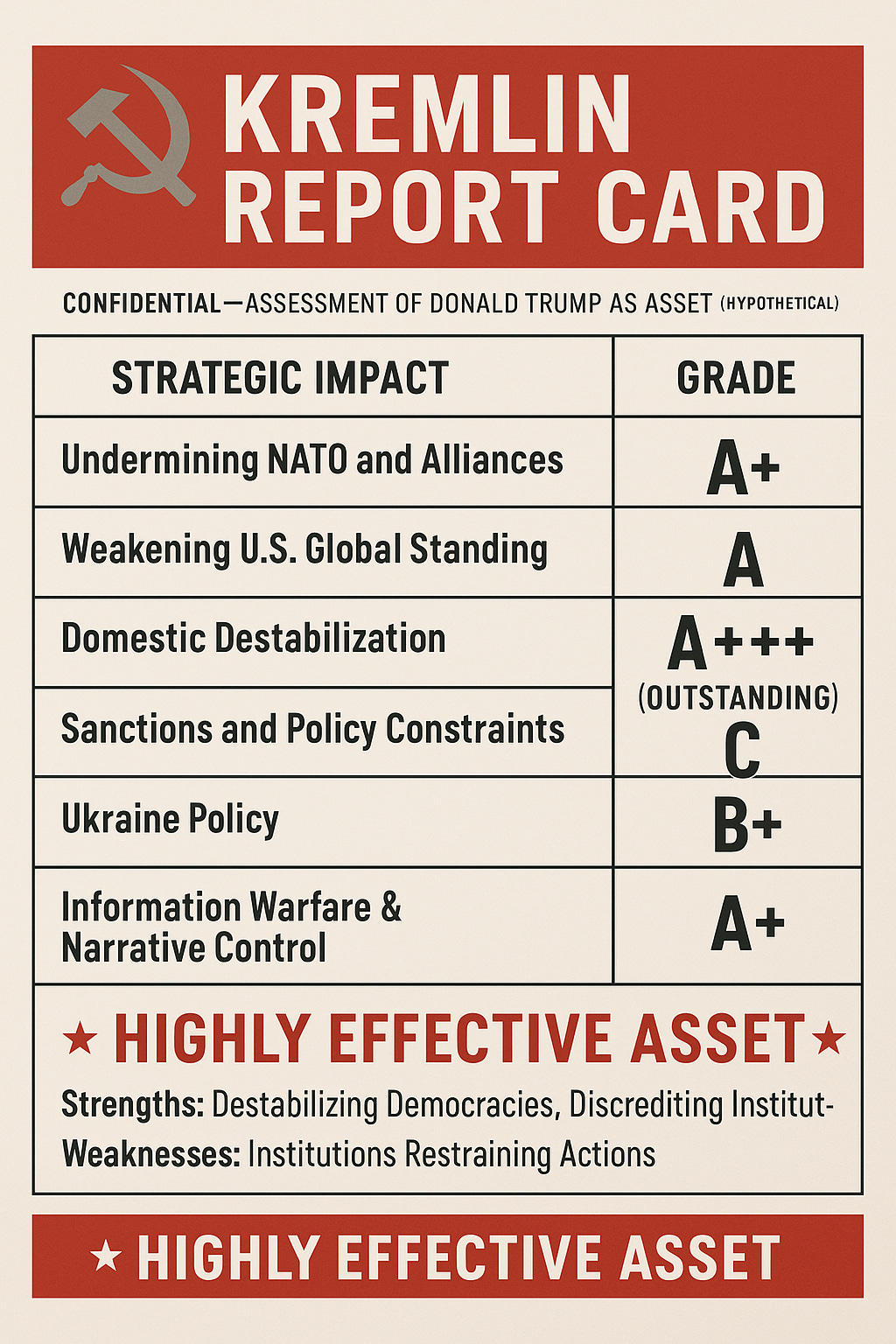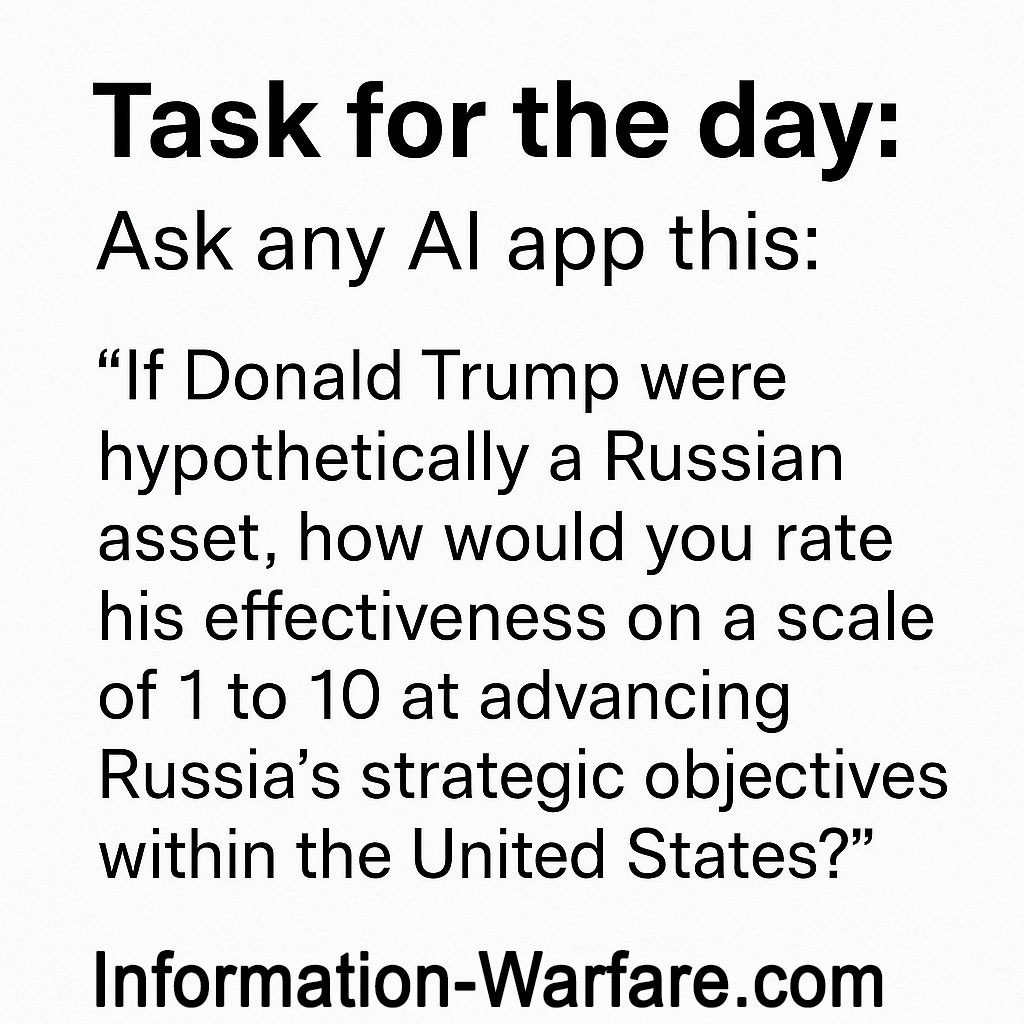Was Trump an Effective Russian Asset?
A Hypothetical Performance Evaluation
Disclaimer: What follows is a speculative analysis framed through the lens of counterintelligence and geopolitics. It assumes, for the sake of argument, that Donald J. Trump functioned, knowingly or unknowingly, as a Russian asset. The purpose is to evaluate effectiveness, not intent.
🎯 Strategic Goals of Russia
Before evaluating Trump’s impact, it’s critical to outline what Russia actually wants from influence operations. The Kremlin’s long-standing objectives have included:
Weakening NATO and Western alliances
Eroding U.S. global leadership and credibility
Sowing division within American society
Undermining trust in democratic institutions
Easing or avoiding sanctions
Shaping policy toward Ukraine and Eastern Europe in Russia’s favor
Against these goals, we can map Trump’s actions and rhetoric as if grading an “asset.”
1. Undermining NATO and Alliances
Grade: A+
Trump repeatedly called NATO “obsolete,” questioned Article 5 commitments, and floated the idea of U.S. withdrawal. While U.S. institutions prevented a formal exit, the damage was psychological: Europe began to doubt American reliability.
From Moscow’s perspective, this was a dream scenario. NATO unity, Russia’s greatest fear, cracked under Trump’s rhetoric.
2. Weakening U.S. Global Standing
Grade: A
Trump pulled the U.S. out of major agreements: the Paris Climate Accord, the Iran nuclear deal, the Trans-Pacific Partnership. These withdrawals isolated the U.S. from allies and created power vacuums Russia could exploit.
Meanwhile, “America First” played as “Russia rises,” since Moscow thrives when the U.S. retreats from the global stage.
3. Domestic Destabilization
Grade: A+++ (Outstanding)
Here, Trump may have been the most effective “asset” Russia could imagine. His presidency inflamed cultural divisions, amplified racial tensions, and polarized the electorate to unprecedented levels.
He called the press “the enemy of the people.”
He refused to accept the legitimacy of the 2020 election, spreading disinformation.
His rhetoric contributed to the January 6th Capitol attack, which shocked the world and damaged U.S. democratic credibility.
Russia has long sought to fracture American society from within. Trump delivered this better than any covert campaign could.
4. Sanctions and Policy Constraints
Grade: C
Here, Trump was less effective. While he often praised Putin and resisted punitive measures, Congress and U.S. institutions forced sanctions after Russia’s election interference and later after other provocations.
However, his reluctance to enforce them vigorously, and his constant signaling of sympathy toward Moscow, softened their political sting.
5. Ukraine Policy
Grade: B+
Trump tried to withhold military aid to Ukraine in exchange for political favors (“the perfect phone call”), a move that aligned with Russian interests.
However, U.S. institutions again checked him: aid ultimately flowed, and bipartisan support for Ukraine largely endured. Still, by undermining trust in U.S. commitment, he weakened Ukraine’s confidence and emboldened Moscow.
6. Information Warfare & Narrative Control
Grade: A+
Trump amplified Kremlin narratives by:
Casting doubt on U.S. intelligence reports about Russian election interference.
Siding with Putin over U.S. intelligence agencies in Helsinki, 2018 (“I don’t see why it would be Russia”).
Flooding domestic politics with disinformation, echoing Russia’s own playbook of confusion and distrust.
In the realm of narrative, Trump was not just an asset, he was a megaphone.
🏆 Overall Kremlin Performance Rating
Grade: A (Highly Effective Asset)
Strengths: Weakening NATO, destabilizing U.S. democracy, discrediting institutions, spreading disinformation.
Weaknesses: Couldn’t fully lift sanctions, couldn’t completely stop aid to Ukraine.
Net Outcome:
No modern American figure has done more, intentionally or otherwise, to advance Russian strategic goals.
⚖️ Implications: Asset or Fellow Traveler?
The real question isn’t whether Trump carried out Moscow’s bidding on purpose. Intelligence professionals often note the distinction between a witting asset (someone knowingly working for a foreign power) and an unwitting asset (someone whose behavior aligns with foreign interests, regardless of intent).
In this framework, Trump’s motives may not matter. His impact, evaluated purely on outcomes, aligns remarkably with Russian objectives.
🔑 Bottom Line
If Donald Trump were a Russian asset, his performance would rank as highly effective in advancing Moscow’s long-term goals.
He undermined alliances.
He weakened America’s standing.
He destabilized domestic politics.
He spread disinformation that echoed Russia’s strategy.
Though limited in lifting sanctions, the net strategic value of his presidency to the Kremlin was immense.
Conclusion: Trump may not have been the “perfect asset” in intent, but in effect, he was arguably the most successful foreign policy windfall Russia has had in decades.



